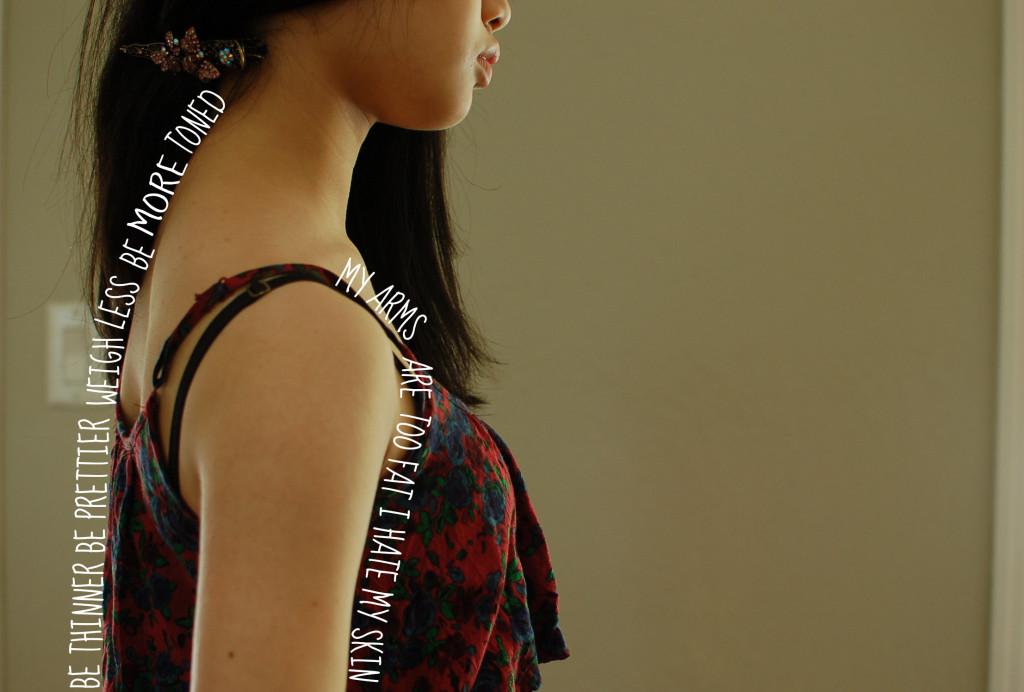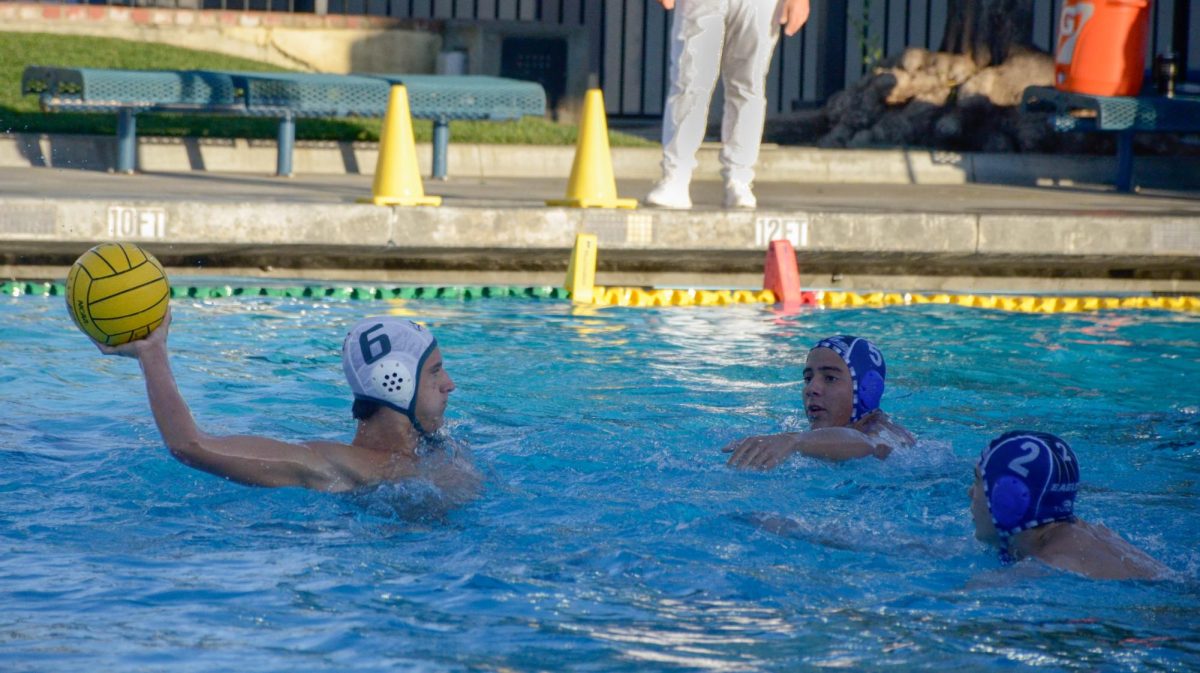National Eating Disorder Awareness Week: “Everybody knows somebody”
This week, from February 24 through March 2, is National Eating Disorder Awareness Week. Spanning over all 50 states and 30 other countries, this year’s theme is “Everybody Knows Somebody.”
February 27, 2013
I was only six years old when I knew that I never wanted to be “fat.” All little girls want to be “pretty”, and to me, that meant being thin. It still does.
This week is National Eating Disorder Awareness Week (NEDAW), seven days devoted to reduce the stigma of eating disorders and improve access to treatment.
In a study completed by the National Association of Anorexia Nervosa and Associated Disorders (ANAD), anorexia is the third most common chronic illness among adolescents. Over one-half of teenage girls and nearly one-third of teenage boys use unhealthy weight control behaviors such as skipping meals, fasting, smoking cigarettes, vomiting, and taking laxatives.
However, the aspiration to be skinny takes root far earlier, even before hitting puberty. In the same study, 81 percent of 10-year-old girls reported being afraid to be fat. Forty-seven percent of fifth to 12th grade girls reported wanting to lose weight because of magazine pictures, and 69 percent reported that advertisement photos influenced their idea of perfection.
In contrast, the body type portrayed in advertising as “the ideal” is possessed naturally by only five percent of American females.
Like any child growing up, I idolized girls in the media, but my choices were slightly unorthodox. While others dreamed of becoming Hannah Montana, I was hoping to become Jo from Little Women, be beautiful like Grace Kelly, and reach the success of Eleanor Roosevelt. Although my tastes were not solely based upon appearance, I aspired to be beautiful, thin, and graceful like Audrey Hepburn.
Throughout the years, I participated in various sports, and almost all of them catered to a lightweight body type. Competitive figure skating, for one, deeply emphasized a thin, petite, and graceful body with a low weight to achieve quicker mid air turns.
However, of all the physical activities I participated outside of school, none stresses so heavily the “ideal” body type more than my favorite: classical ballet.
I have been dancing ballet for as long as I can remember and even have had the pleasure to dance in New York with the prestigious Joffrey Ballet. Ballet is a highly competitive, high-pressure, and physically demanding sport that is also an art.
Even at a high school level, there is pressure to have an ideal “Balanchine” body type: tall and slender with a long neck, hyperextended legs, short torsos, and of course, thin as can be.
The fact of the matter is that it is the ideal ballet body for a reason. Like in any competitive sport, it is a great advantage to have the “ballet body”; having a high foot arch is the dance equivalent to being a tall basketball player.
Although I have never felt the urge to vomit in order to become thinner, I certainly felt the pressure to be thin. I, in more ways than one, am not the ideal ballet dancer. I have wide hips, am short in stature, and have a practically nonexistent thigh gap.
Sometimes, I would decrease my food intake in hopes of being thinner; I still ate, but not as much as I should. I would go running, but I saw no “improvement.”
During that time, I felt constantly tired, always hungry, performed worse than I did before, and I didn’t even lose much weight. Needless to say, I stopped. It just wasn’t worth it. It never is.
However, some of my fellow dancers I know do not have the same tenacious willpower that I possess. I personally know at least three girls who have starved themselves to be thinner, and not all of them are dancers. I know at least two people who have forced themselves to vomit, and more people than I can count, female and male, who are insecure about their appearance.
I am insecure about my appearance, although I’m not particularly concerned with being perceived as beautiful. My body image insecurity roots from some ineffable feeling of incurable inadequacy, even if the only person I may be inadequate for is myself.
The theme for this year’s NEDAW is “Everybody Knows Somebody.” If you didn’t previously know somebody before, you do now. My name is Kaity Gee, and I just wanted to be pretty. We all do–it’s human nature to strive for perfection, but starving yourself in hopes of becoming morbidly underweight is not the answer.


















![“[Building nerf blasters] became this outlet of creativity for me that hasn't been matched by anything else. The process [of] making a build complete to your desire is such a painstakingly difficult process, but I've had to learn from [the skills needed from] soldering to proper painting. There's so many different options for everything, if you think about it, it exists. The best part is [that] if it doesn't exist, you can build it yourself," Ishaan Parate said.](https://harkeraquila.com/wp-content/uploads/2022/08/DSC_8149-900x604.jpg)




![“When I came into high school, I was ready to be a follower. But DECA was a game changer for me. It helped me overcome my fear of public speaking, and it's played such a major role in who I've become today. To be able to successfully lead a chapter of 150 students, an officer team and be one of the upperclassmen I once really admired is something I'm [really] proud of,” Anvitha Tummala ('21) said.](https://harkeraquila.com/wp-content/uploads/2021/07/Screen-Shot-2021-07-25-at-9.50.05-AM-900x594.png)







![“I think getting up in the morning and having a sense of purpose [is exciting]. I think without a certain amount of drive, life is kind of obsolete and mundane, and I think having that every single day is what makes each day unique and kind of makes life exciting,” Neymika Jain (12) said.](https://harkeraquila.com/wp-content/uploads/2017/06/Screen-Shot-2017-06-03-at-4.54.16-PM.png)








![“My slogan is ‘slow feet, don’t eat, and I’m hungry.’ You need to run fast to get where you are–you aren't going to get those championships if you aren't fast,” Angel Cervantes (12) said. “I want to do well in school on my tests and in track and win championships for my team. I live by that, [and] I can do that anywhere: in the classroom or on the field.”](https://harkeraquila.com/wp-content/uploads/2018/06/DSC5146-900x601.jpg)
![“[Volleyball has] taught me how to fall correctly, and another thing it taught is that you don’t have to be the best at something to be good at it. If you just hit the ball in a smart way, then it still scores points and you’re good at it. You could be a background player and still make a much bigger impact on the team than you would think,” Anya Gert (’20) said.](https://harkeraquila.com/wp-content/uploads/2020/06/AnnaGert_JinTuan_HoHPhotoEdited-600x900.jpeg)

![“I'm not nearly there yet, but [my confidence has] definitely been getting better since I was pretty shy and timid coming into Harker my freshman year. I know that there's a lot of people that are really confident in what they do, and I really admire them. Everyone's so driven and that has really pushed me to kind of try to find my own place in high school and be more confident,” Alyssa Huang (’20) said.](https://harkeraquila.com/wp-content/uploads/2020/06/AlyssaHuang_EmilyChen_HoHPhoto-900x749.jpeg)











